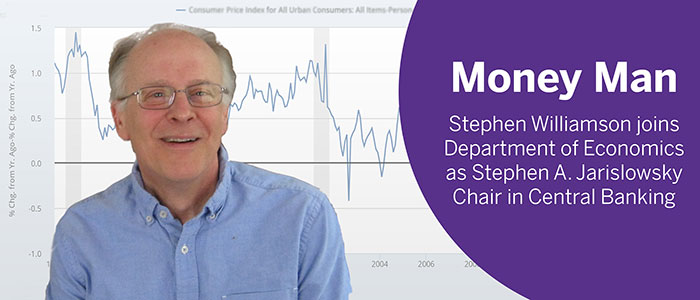News and Updates
Contact
Faculty of Social Science
Social Science Centre
Room 9438
Western University
T. 519-661-2053
F. 519-661-3868
E. social-science@uwo.ca
Money Man: Stephen Williamson is the Stephen A. Jarislowsky Chair in Central Banking
May 16, 2017 
The Faculty of Social Science and the Department of Economics at Western University are proud to welcome Stephen Williamson as the Stephen A. Jarislowsky Chair in Central Banking.
Williamson is an expert in monetary policy, and most recently held the position of Vice President in the Research Department of the Federal Reserve Bank of St. Louis.
The Stephen A. Jarislowsky Chair in Central Banking was established through a $2 million donation from The Jarislowsky Foundation and matching funds from Western. It is intended, in part, to build on Western’s traditional strength in the field of monetary economics. From the late 1970s to the 1990s, led by the work of Jeremy Greenwood, Peter Howitt, Gregory Huffman, David Laidler, Michael Parkin, Bruce Smith, and others, Western was the destination for training in central banking.
“We are very thankful for the contribution from The Jarislowsky Foundation,” said Bob Andersen, Dean of the Faculty of Social Science. “Bringing in a prominent scholar like Stephen Williamson is a great opportunity for the Faculty as we move our research agenda forward.”
“This position has allowed us to attract at a high level, bringing back prominence of the Department in this field,” said Audra Bowlus, Chair of the Department of Economics. “It provides a monetary perspective we haven’t had in a while, and strengthens our connection to policy makers in this area.”
Graduates from the Economics Department have gone on to hold key appointments in central banks around the world. For example, Carolyn Wilkins, Tiff Macklem and Paul Jenkins are all current or former senior deputy governors of the Bank of Canada. Stephen Poloz is the current Governor of the Bank of Canada, and Glenn Stevens is the former Governor of the Reserve Bank of Australia.
“Western has had a long history of graduating students serving central banking roles in Canada, and elsewhere in the world, at all levels,” said Williamson. “I hope to help build on that strength by promoting research in central banking by faculty members and students at Western, and by channeling time and resources into academic conferences on central banking topics.”
Williamson’s career includes time spent at universities in the US and Canada, the Bank of Canada, and several Federal Reserve Banks across the United States. From 2014 to 2017, Williamson has been a Vice President at the Federal Reserve Bank of St. Louis.
“We are extremely excited to appoint someone of Williamson’s caliber as the first person in this position,” said Andersen. “It’s a great coup for the Department and the Faculty to bring him back from the US and his position with the Fed.”
“Landing Stephen exceeded our expectations,” said Bowlus. “He has instant name recognition in the field. He will become a senior leader of the macroeconomics group here at Western, will be a leader at the Bank on policy matters, and a leader on the Canadian macroeconomics scene. That’s all great for the Department and Western.”
Bowlus said Williamson’s connection to central banks is great for the Department. “When working on models, it is very important to understand how monetary policy is made and works to be able to give advice. You can’t do that without being connected to central bankers and policy makers. Without that, you are working in a vacuum and people won’t listen to your advice,” said Bowlus. “Leaders at the Bank of Canada know Stephen and he knows how monetary policy in Canada works. Hopefully, his links with central banks will help with the Department’s policy connections, as well as with the placement of our graduates in policy-related positions and with younger faculty members as they begin to establish themselves in the policy community.”
His position at the Federal Reserve Bank of St. Louis connected Williamson’s research to the policy decisions of central bankers.
“At the St. Louis Fed, we have a lot of freedom to pursue our own research interests. In terms of my research activities, there is little difference from academia. I go to the same conferences, publish my work in the same academic journals, and go about my research in the same way as if I were working at a university,” said Williamson. “But working at the Fed exposes me to monetary policy issues on a daily basis, and that is very exciting. I even occasionally get to accompany the St. Louis Fed President to the FOMC (Federal Open Market Committee) meeting in Washington, D.C. Policy work here is an important input into my research, and I've learned a lot doing it. I'll miss that when I leave here. But, I'm looking forward to interacting with students again, after a three-year hiatus. That's also very stimulating, and I've missed it.”
Williamson was born in Canada, completing his BSc and MA at Queen’s University prior to pursuing doctoral work in economics at the University of Wisconsin-Madison. He worked at the Bank of Canada, Queen’s, and Western early in his career before taking on academic positions in the US.
“I have not lived and worked in Canada for 25 years. I'm coming home, but to a country that has changed a lot since I left,” said Williamson. “I'm very excited to have the opportunity to contribute again to the Department of Economics at Western, to the University, and to Western students, both at the undergraduate and graduate levels.”
The Jarislowsky Foundation, based in Montreal, was founded by Canadian businessman and philanthropist Stephen Jarislowsky in 1991. Since then it has established 29 chairs in Canada in a number of fields, including education, medicine and art.

